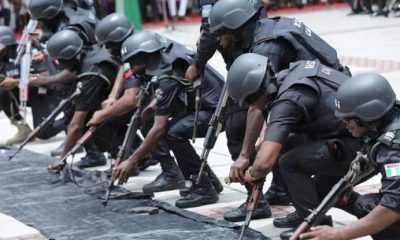
News
South-West Governors Champion State Policing

South-West Governors Rally for State Policing to Combat Rising Insecurity In a bold move to address Nigeria’s escalating security challenges
iexclusivenews – South-West governors have united in their call for the establishment of state police forces.
This push for decentralized law enforcement comes as the nation grapples with unprecedented levels of crime and violence, leaving many citizens feeling vulnerable and unprotected.

At the forefront of this campaign is Ondo State Governor Lucky Aiyedatiwa, who made a compelling case for state policing during the 64th annual general conference of the Nigerian Bar Association (NBA) in Lagos.
The conference, themed “Is State Police a Solution to National Insecurity?”, provided a platform for governors to voice their concerns and propose solutions to the country’s security woes.Governor Aiyedatiwa didn’t mince words as he highlighted the shortcomings of the current centralized policing system.
Table of Contents

He argued that the evolving nature of security threats, including kidnappings, banditry, and terrorism, has overwhelmed the federal police force, necessitating a more localized approach to law enforcement.
“We require a decentralized security system that takes into account our diverse socio-cultural terrains and environmental peculiarities in the management of crimes,” Aiyedatiwa stated, emphasizing the need for tailored security solutions that reflect the unique challenges faced by different regions.
The governor pointed to the success of the Western Nigeria Security Network, commonly known as Amotekun Corps, as a shining example of what state policing could achieve.
Established under the leadership of late Governor Rotimi Akeredolu, Amotekun has been credited with restoring peace and security in Ondo State, serving as a blueprint for potential state police forces across the nation.
South-West Governors Unite for Security Reform
Joining the chorus of support for state policing, Oyo State Governor Seyi Makinde, represented by former Attorney General Prof. Oyelowo Oyewo, challenged long-held myths surrounding the country’s centralized police system.
Makinde emphasized the urgency of adopting state policing to tackle the rising insecurity across the nation, dismissing concerns about potential abuses of power by state governments.”No scientific endeavor known is free from abuse.
If science was to think of abuse, we would not move on,” Makinde argued, urging stakeholders to focus on the potential benefits rather than unfounded fears.
Rivers State Governor Siminalayi Fubara echoed these sentiments, expressing concerns about the limitations of the current federal policing system in addressing crime effectively across Nigeria.
He questioned the ability of a centralized force to tackle the unique security challenges faced by different states, particularly those grappling with frequent kidnappings and violent crimes.
South-West Governors Propose Multi-Layered Approach
While the majority of South-West governors strongly advocate for state policing, some voices urge caution and a more nuanced approach.
Jigawa State Governor Umar Namadi, represented by Attorney General Bello Fanini, proposed a multi-layered police system that would allow state-level policing to complement the federal police.
“We still need the federal police because of the dynamics of crime,” Fanini explained, emphasizing the importance of synergy between state and federal forces to create a comprehensive security network.
As the debate over state policing intensifies, it’s clear that the South-West governors are leading the charge for a fundamental shift in Nigeria’s approach to law enforcement.
Their united front and compelling arguments have thrust the issue into the national spotlight, forcing policymakers and citizens alike to reconsider the merits of a decentralized police force.
While challenges remain, including concerns about funding, training, and potential political interference, the momentum behind state policing continues to grow.
As Nigeria grapples with its security crisis, the voices of these South-West governors may well be the catalyst for a transformative change in the nation’s law enforcement landscape.
As the debate rages on, one thing is certain: the push for state policing by South-West governors has ignited a crucial conversation about the future of security in Nigeria.
Whether this bold vision becomes a reality remains to be seen, but its potential to reshape the nation’s approach to public safety cannot be underestimated.






















